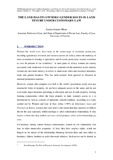The Land has its Owners! Gender Issues in Land Tenure Under Customary Law
This paper looks at issues of gender and tenure in African customary law. It argues that under all systems of law in many African countries, ownership of land and associated resources is very much anchored in patriarchy. It decries the failure to isolate positive aspects of customary law and the preponderance of women-unfriendly customary law which influences statutory and other forms of law. Part II of the paper provides the conceptual and theoretical premises of the paper. It looks at patriarchy, gender and law and their impact on tenure relations emphasising the male dominance.






